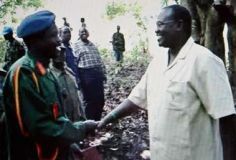Justice or peace? South Sudan meets rebel LRA
June 2, 2006 (JUBA) — Why would Africa’s youngest regional government risk world opprobrium by meeting with and supplying a guerrilla commander notorious for slaughtering civilians, abducting children and mutilating his victims?
 The government of Southern Sudan last month shocked many regional observers by holding unprecedented talks with fugitive Lord’s Resistance Army (LRA) leader Joseph Kony and giving him food and $20,000 in cash.
The government of Southern Sudan last month shocked many regional observers by holding unprecedented talks with fugitive Lord’s Resistance Army (LRA) leader Joseph Kony and giving him food and $20,000 in cash.
The LRA — which has waged a two-decade insurgency in neighbouring northern Uganda that has triggered a humanitarian catastrophe — has no clear politics and is reviled for its massacres and for cutting off the lips or ears of captives.
The atrocities prompted the International Criminal Court (ICC) to name Kony and his top henchmen in its first arrest warrants last year. But he has proved as elusive as ever, and meanwhile the LRA has increasingly turned its guns and machetes on impoverished villagers across the south of Sudan.
The world was stunned by video images of Kony — the first pictures of him in more than a decade — meeting Southern Sudan Vice President Riek Machar in the bush near Nabanga, a remote village close to the border with Democratic Republic of Congo.
The pair pledged to end fighting and Machar said he was ready to mediate between the LRA and Ugandan President Yoweri Museveni.
But a Sudanese bishop accused southern authorities of “bribing” the LRA commander with cash to end his attacks and many in the south were equally bewildered by the move.
“Truly, citizens must be scratching their heads,” the south’s main English-language paper said in an editorial. “The LRA may well eat from the government of south Sudan for dinner and then loot villages for desert.”
FORGIVENESS
Analysts say, however, playing successful peacemaker would be a huge boost for the southern administration which would not only eliminate a security threat but also demonstrate a political maturity on the world stage.
Sudan’s southern administration is 80 percent controlled by the former rebels of the Sudan People’s Liberation Army/Movement (SPLA/M), which fought Africa’s longest war against the northern government. Two million people were killed and 4 million others displaced in the fighting.
A peace deal signed last year ended the conflict but implementation of the agreement has been delayed, with analysts saying Khartoum has exploited weaknesses and disorganisation within the SPLA to slow the pace.
The death of southern leader John Garang in a helicopter crash last year also rocked the movement, leaving his less charismatic successor, Salva Kiir, to pick up the pieces.
That, coupled with a lack of promised donor funds, as well as fighting between militia factions, has thwarted SPLA efforts to live up to impossibly high expectations among its people.
Residents of the south — one of the poorest areas on earth — who have so far seen little of the promised “peace dividend”.
The LRA is partly responsible for the lack of progress. The group has threatened aid workers using the major roads into Juba and greatly reduced an expected inflow of development support.
“South Sudan has been the site of increased LRA activity in the last eight or nine months, so obviously there is a national security interest in trying to pacify the rebels,” said analyst David Mozersky.
“The government of South Sudan is in the unique position of being able to mediate between Uganda and the LRA.”
“OUR LAWS”
Despite LRA implication in crimes in southern Sudan, Kiir has rebuffed calls to hand over Kony to international prosecutors at the ICC in the Hague.
“The laws Kony broke are not European laws, they are our laws,” Kiir said as he unveiled details of the meeting during a May 16 speech at Garang’s grave in the southern capital Juba.
“It is up to us to forgive Kony or not.”
After Machar’s meeting with Kony, Museveni, who has been fiercely committed to Kony’s capture, gave him until Aug. 1 to surrender and receive safe passage.
Some in Uganda’s military, however, vowed to continue to hunt him and said the peace overtures to the LRA showed weakness in the SPLA’s capacity to ensure security in its territory.
“It looks desperate,” said a Ugandan army source.
“Why not catch or kill Kony once you are finally sure where he is, and then bask in the praise of the international community? The man is public enemy number one for Africa.”
But others disagreed, and said the south Sudanese government were right to pursue whatever path to peace it chose.
“I think it was clever to meet Kony. Good luck to them. They are not a sovereign state, so they can do what they like, regardless of the ICC,” said James Ellery, regional coordinator in the south for the U.N. mission in Sudan.
(Reuters)
